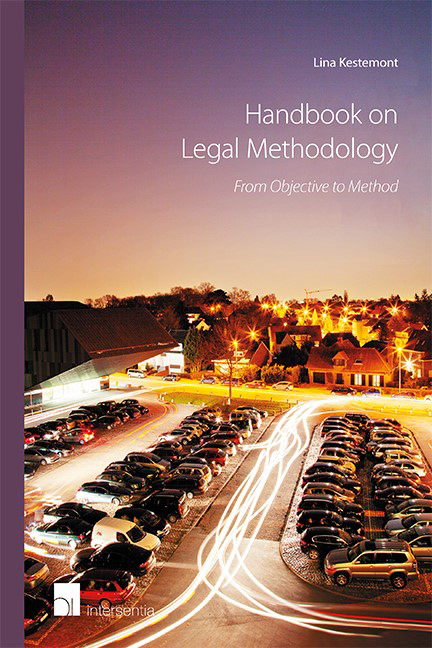Book contents
Summary
“La recherche en droit ou sur le droit n’est pas en quête de méthodes, mais elle est en quête d’identité quant à ses méthodes.”
NEED FOR AN EXPLICIT LEGAL METHODOLOGY
Legal scholarship is one of the oldest academic disciplines and the study of law has been passed on from generation to generation as an implicit “savoir faire.” This means that during their education legal students learned how to find, analyze, apply and improve the law without explicitly considering the methodological choices they make throughout this process. Moreover, it was presumed that all legal scholars understood the methodology of legal research, making its explicit clarification and justification unnecessary. Due to the absence of an explicit methodological tradition, handbooks and literature on legal methodology did not exist. Therefore “the conventions, informal praxis, requirements and rules of play of academic legal research remain largely unwritten.”
The lack of an explicit legal methodology made it difficult for legal scholars to explain their research praxis to scholars from other academic disciplines. The last decade this has become problematic because of the growing interdisciplinary collaboration at universities and the increased importance of external funding, often granted by mixed experts panels. Due to this, legal scholars have become more aware of the importance of an explicit methodology.
Despite an increased awareness, the reflection of legal scholars on methodology was too often limited to their own personal research experiences. Only occasionally the methodological identity of legal scholarship was studied from an empirical point of view. In order to address this lacuna, a PhD project was designed to empirically explore the methodological features of legal scholarship. Essential to the project was a meta-methodological study of 45 Dutch-language PhDs on social security law defended at a Flemish or Dutch Law Faculty between 1971 and 2015. The results of the meta-study were used to complete and refine the existing, but limited literature on legal methodology.
The PhD project aimed to design an explicit methodological framework for legal scholarship. Such methodological framework lists on the one hand the research objectives legal scholars can pursue in their research, and on the other hand their methodological features.
- Type
- Chapter
- Information
- Handbook on Legal MethodologyFrom Objective to Method, pp. 1 - 8Publisher: IntersentiaPrint publication year: 2018



